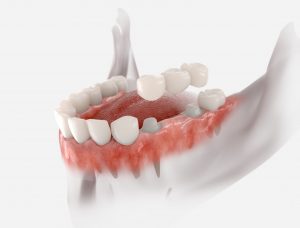
Dental bridges are a great way to refill your smile after tooth loss because they can help you eat and speak more normally again. They consist of several false teeth (pontics) in a row that your dentist attaches to abutments (supporting teeth) in your mouth. Though they’re durable enough to last 10+ years with the right care, they’re not entirely indestructible. It’s not unheard of for them to become damaged or dislodged. Read on to learn more about 3 reasons why your dental bridge might fail and how you can prevent it!
Reason #1: Poor Oral Hygiene
One of the main culprits behind dental bridge failure is unhealthy oral hygiene habits. This is because your restoration relies on two supporting teeth at both ends of the bridge for stability. It’s necessary, therefore, for your dentist to whittle away some of the abutments so that the dental bridge can fit snuggly over them and still line up correctly against your gums. This impacts the structure of the underlying tooth and leaves it more vulnerable to developing tooth decay. If it becomes too corroded, it can no longer support your dental bridge.
You can prevent this by brushing your teeth for two minutes every day, both morning and night, followed by flossing. It’s the simplest way to consistently remove plaque buildup from around your pearly whites and below your gums so that toxic bacteria don’t flourish.
Reason #2: Not Watching What You Eat
The porcelain used for dental bridges is quite resilient but can chip or break if you’re not careful. To avoid physically harming them, drop nervous habits like biting your nails or chewing inanimate objects like pen caps.
You should also steer clear of certain foods known to injure them, like:
- Ice
- Nuts
- Hard or chewy candies
- Crunchy foods
Raw fruits and vegetables can also damage your dental bridge if you don’t first cut them into manageable pieces. Fortunately, by being aware of what you’re putting into your mouth, you can keep your restoration in good health.
Reason #3: Teeth Grinding
It’s not uncommon for people to subconsciously grind their teeth while asleep at night or during times of stress. Unfortunately, this habit can also damage your prosthetics. The force of your upper arch pressing against your lower one is enough to crack the pontics, in addition to potentially causing a TMJ (temporomandibular joint) disorder that results in a stiff or locked jaw. It can also push your remaining natural teeth out of alignment which can alter the support structure that your dental bridge relies on.
In many cases, oral appliances are used to relieve symptoms of bruxism. Different massage and exercise therapies can also help address it, so you don’t cause additional problems in your mouth.
If you’ve noticed your dental bridge is loose or has begun slipping out of place, give your dentist a call. They’ll examine your condition to verify any potential areas of concern to mend them so that you can continue making the most of your restoration for years to come!
About the Practice
At Berquist Family Dentistry, you and the entire family benefit from two dentists dedicated to improving lives by enhancing oral well-being. They are committed to serving patients of all ages so that you and your little ones don’t have to visit multiple providers for dental care. With a full range of services available, they’re sure to have the right solutions to meet your individual needs. You’re welcome to request an appointment on the website or by calling (219) 226-0544.








